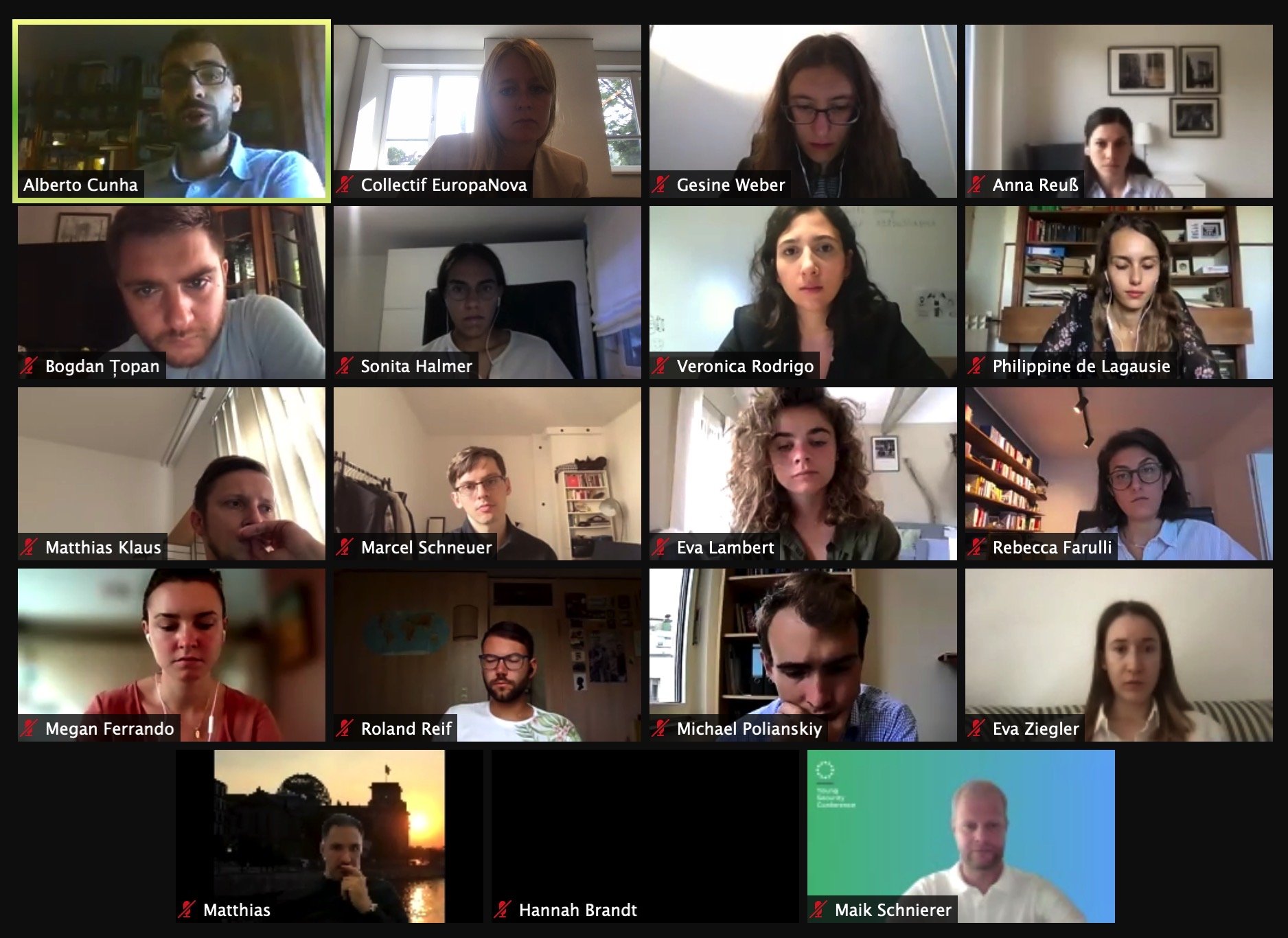
Empty Chairs - Engaged Minds
Europe and Strategic Autonomy - Future Challenges
#YSC2021: 12. -13. July 2021, Munich, Germany
The second conference was held in July 2021. It succeeded in delivering content to a high standard, building upon its inaugural edition in February 2020 despite the conditions imposed by the Covid-19 pandemic.
The future of the European Union depends on public support, particularly in security and defence policies.
We believe that Europe needs all generations to rethink the political design of the European Union in the long term.
Due to the pandemic in 2021, the YSC adapted its traditional format to respond to restrictions on gathering. Despite being online, the YSC still brought participants together, facilitating meaningful connections and a lively exchange of ideas, through a discussion of topics of major relevance to the current state of Franco-German and European political affairs.
The 2021 event anchored its multidisciplinary reflections on key concepts, such as the role of the West on today’s global challenges and the role of the Franco-German couple at the centre of the European integration process - one which survived a difficult decade and thus finds itself at a crossroads. Through the submission of policy papers, workshops, panels, and innovative exchanges and techniques, the conference provided a perfect environment for sharing and discussing new ideas related to the new EU strategic autonomy at all levels. In 2021, the YSC hosted policy sessions with high-ranking policy makers & some of the best thinkers from all over Europe!
The network of YSC Fellows continued to grow and contributed effectively to the overall goals of the Franco-German dialogue we seek to promote, during and after the conference. The new concept of the YSC Fellow Workshops, introduced in 2021, will be key to nurturing the growing community of YSC alumni.
Our Topic Pillars for 2021
-
The panel discussion on European sovereignty focused on "new challenges and opportunities" for the EU's open strategic autonomy and sovereignty and was organized by the YSC in cooperation with the European Liberal Forum.
The moderator of this session was Yana Humen, Policy Coordinator at Microsoft and member of the Friedrich Naumann Foundation's Defense Expert Network. Three renowned experts came together on the virtual stage, bringing three different different backgrounds to the discussion: the academic world, the world of think tanks and political decision-making.
The session addressed the question of how strategic autonomy and sovereignty can be defined, in which policy areas it occurs and should occur, and what opportunities and challenges exist, as well as reflecting on the broader global geopolitical context.
-
At the panel discussion on health security, the link between security, health and the economy was discussed. The COVID-19 pandemic has shown the challenges of cross-sectoral cooperation in the health sector and how it fits into the broader security paradigm. Health and security are hugely important both in academic debate and in practice; however, they are missing from European defense policy. In particular, the link to global issues, such as how vaccines become political issues and how health sectors are used as tools of war, shows that health needs to be discussed in a different way.
-
The panel on the EU and its neighborhood focused on recent developments in the EU's eastern and southern neighbors and the ways in which these influence transatlantic relations. In order to assess the effectiveness of the European Neighborhood Policy (ENP) as a foreign policy instrument, it is necessary to look at the history of its development. Originally, the ENP was seen as a foreign policy instrument to replace the very successful enlargement policy after the end of the Cold War. The beginnings of the ENP are rooted in a very optimistic context in which the liberal institutional order in the Eastern European countries was growing through the EU and NATO, suggesting that the EU should transform the countries close to it and the countries that wanted to join it. In this context, the main objective was the EU's intention to project its model onto the ENP. The policy of rapprochement with the southern and eastern peripheries of the EU was to include this projection of the normative dimension of the EU, the rule of law, respect for human rights and democracy, and the idea of democratic development. However, the idea that a one-size-fits-all approach could be applied to all ENP countries has obviously failed. In addition, the EU has reached its limits in its cooperation with these countries and has not sufficiently addressed the context in which these attempts to forge partnerships with these countries have taken place.
-
The moderator of this session was Miriam Müller, PhD student and YSC fellow. The virtual stage brought together three renowned experts who brought different backgrounds and experiences to the discussion. Audience participation was invaluable and indeed, after a short round of presentations, the discussions followed the questions posed by the YSC fellows.
Participants were unanimous in describing the urgency and scale of the climate problem we face. It was mentioned that the reduction in carbon emissions required to avoid a climate catastrophe is so high that the only moment in recent history when it has been achieved was during the lockdowns associated with the global pandemic of 2020, when such reductions were achieved. Climate change continues to be a global problem, and even Western affluent countries are facing its drastic effects. Examples of this are the increasing calls for military intervention in the event of extreme weather events.
-
The panel discussion on digital and cyber policy focused on the current state of security in cyberspace, the role of public and private actors, institutional approaches to intergovernmental cooperation as well as new trends and the future of cybersecurity in the European Union. The increasing hyper-connectivity of modern societies, resulting from the ubiquitous use of the internet and information and communication technologies, is not only creating new opportunities, but also unprecedented risks and threats. This problem is particularly evident when considering the increasing interconnectedness of critical infrastructures across Europe and the high vulnerability of key services in cyberspace. Following several cyber-attacks in Europe and a number of incidents worldwide, such as the recent cyber-attack on the Colonial Pipeline in the US, the need for adequate cyber incident prevention and response capabilities is becoming increasingly clear.



